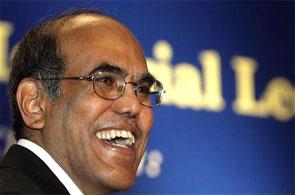 | « Back to article | Print this article |
When the Reserve Bank of India (RBI) increases rates, banks happily raise rates. But when RBI cuts rates, banks are stuck with high-cost deposits. RBI Governor D Subbarao tells Manojit Saha that banks’ response to the central bank’s monetary intervention is asymmetric. Excerpts:
Do you see a disconnect between what the policy says and action on the ground? While the policy document talks about calibration of policy rate in either direction, you have still gone for a rate cut...
I don’t think so. If communication is seen as an instrument of policy, our communication through the document should be seen as a part of the action. So, we reduced rate today but communicated about what we might or might not do in the future. I don’t think you should see that as a disconnect. Rather, you should see it as our endeavour to use communication to guide the market.
 Are you using communication to temper the exuberance of market participants?
Are you using communication to temper the exuberance of market participants?
We take that into account but we have no view about the exuberance of the market. I know that one central bank governor had famously commented on that.
Do you believe growth has bottomed out?
I believe so. If we grew at five per cent last year and believe that we will grow at 5.7 per cent this year, by inference it says that growth has bottomed out. Please note that RBI’s estimate is the most conservative among all the estimates. But that’s not saying very much. This country needs to grow much faster. We got to do all the right things at the right time.
How difficult is it to manage the expectations of the market, the government, and media?
Well, I would not be less than honest to say that it does not complicate decision-making. All stakeholders, including the government, have expectations about what the central bank might do. So that does add to the complexity of the decision making. But, I don’t think at a fundamental level, it changes the decision that you make. At least, I tried to be objective about the decisions irrespective of expectations around.
Do you expect monetary transmission to happen?
If you are thinking of monetary transmission in the next one week, you may not see any dramatic announcements. But the cumulative monetary transmission, as a consequence of the easing that was done by RBI in the last one year, is still in progress. I believe that will continue to take place, if not immediately, but over the next few months.
There is a view that when rates were hiked, banks responded with lending rate hike. But when rates are lowered, the response from banks is not that prompt. Do you agree?
Yes, experience shows response of banks is asymmetric. When we are raising rates, they are happy to raise rates, but when we are cutting, they are stuck with high-cost deposits. So the flexibility of the response is restricted. So, it’s a problem there.
RBI had said the credit flow to productive sectors will be ensured. What has refrained you from cutting CRR?
We believe that liquidity deficit is not structural in nature. There is a liquidity deficit, but that is with only a few banks. Also, banks have liquidity buffer. So we believe there was no case for a CRR cut.
RBI has restricted the import of gold on consignment basis by banks only to meet the genuine needs of exporters of gold jewellery. What was the motive behind this action?
The idea was to put some sands into the wheels of imports of gold by banks. Now banks import on a consignment basis. They have no credit risk, no exchange rate risk, and they don’t have to provide for capital. The idea in prohibiting gold import on consignment basis is to restrain banks from importing gold.
Do you think there was gold coin import for speculative purpose?
Yes, certainly some people were speculating, but that demand was not very high. There is consumption demand, there is also demand for gold to hedge against inflation.
RBI has said it will issue some clarifications on banking licence issues raised by the stakeholders. When is that expected?
It is expected by the end of May.
Why is granting a banking licence a single-window opportunity and not a continuous process?
You must note we have not given any licence in the past 10 years. So there was a lot of pent-up demand. So, this time we have to go through a batch process. But once this is completed, we will have to review the question whether we can keep banking licensing as a tap.
You had said earlier you wish to take the country back to the high growth path before you retire as RBI governor. At this point in time, it seems that may not be possible. Would you be open to any proposal for continuing in the Reserve Bank for some more time?
No. I don’t think taking the economy back to the high growth trajectory depends on one governor. I think there is enormous amount of talent here. I don’t think one person is crucial for that.